Performances By Actors Doing Woody Allen Impressions In Woody Allen Movies, In Ascending Order Of...
Performances By Actors Doing Woody Allen Impressions In Woody Allen Movies, In Ascending Order Of Quality
by Will Leitch

16. Jason Biggs, Anything Else
15. Kenneth Branagh, Celebrity
14. Larry David, Whatever Works
13. Scarlett Johansson, Scoop
12. Michael J. Fox, Don’t Drink The Water
11. Will Ferrell, Melinda and Melinda
10. Edward Norton, Everyone Says I Love You
9. Ewan McGregor, Cassandra’s Dream
8. Seth Green, Radio Days
7. Tobey Maguire, Deconstructing Harry
6. Mia Farrow, Alice
5. Gene Wilder, Everything You Ever Wanted To Know About Sex (But Were Afraid To Ask)
4. Gena Rowlands, Another Woman
3. John Cusack, Bullets Over Broadway
2. Rebecca Hall, Vicky Christina Barcelona
1. Michael Caine, Hannah And Her Sisters
Will Leitch is a contributing editor at New York magazine and the founder of Deadspin. He is the author of four books, including, most recently, Are We Winning?
D.C. 'Buttman' Porno Farce Trial Going Horribly for Jurors
“Yesterday, jurors in the John ‘Buttman’ Stagliano obscenity trial got a 50-minute display of milk enemas. Today, prosecutors turned their focus to a different substance. This morning, jurors viewed a 36 minutes scene from Storm Squirters 2: Target Practice.”
-The plot is narrated in this fine accounting. SPOILER: the title isn’t entirely in keeping with the film’s conclusion!
Michael Jackon's Estate To Possibly Become State Park

This is one of those news stories where the jokes practically write themselves. But we think this is a fantastic idea, to adapt Neverland Ranch into a park, because, I mean, what else would you do with it? The only other thing you could probably do is turn it into some kind of museum of insanity or maybe erect some kind of giant pillar covered in glitter as a memorial. Actually, a giant Washington Monument covered in glitter sounds kind of awesome. Why aren’t all national monuments covered in glitter? Thoughts?
Coheed and Cambria Covers The Smiths (What?)
In a move that is probably due to the Large Hadron Collider making everyone in the world insane because of neutrinos and what not, Coheed and Cambria, the prog-rock band that mostly writes about spaceships and evil alien empires, covered The Smiths-they did a cover of “A Rush And A Push And The Land Is Ours,” off The Smiths’ last album Strangeways, Here We Come. The cover isn’t terrible, but it does have that nagging “fantasy rock” sound that seems to accompany a lot of the band’s music lately. But if you can get past the goblins and trolls vibe, it’s pretty neat. And if you haven’t heard anything coming out of the AV Club’s Undercover series you definitely should.
New York's Strongest's Garbologist Is Answering Questions!
“The department’s many benevolent societies make up another set of subcultures. These are organized around religion (the Holy Name, for example, serves the department’s Roman Catholics) and ethnicity (like the Afro-American Benevolent Society, the Emerald Society and the Columbian Society, among others). One of the newest of these is the United Women of Sanitation Association.”
–I’ve been waiting for this all week! So fascinating!
Bun B, "Let 'Em Know," And Aging In Rap
The new song from Bun B really does seem, as the venerable MC says at the outset, to have been “a long time coming.” It was produced by Gangstarr’s DJ Premier, and so brings together two of hip-hop’s very most revered practitioners. Bun and Premier are both from Texas, too, though Premier made his name after moving to Brooklyn in the late ’80s. What’s most interesting about the song to me today, besides the mesmerizing beat and the jaw-dropping rhymes (“When I get to gladiatin’ on haters like Leonidas/Niggas just gonna have to admit that he the tightest…” Triple exclamation points) is how old these guys are. Premier is 44, Bun is, at the very, very least 37 or 38. (He was recently quoted talking about having children aged 24 and 25.)
I wrote last week about how surprised I was to hear Schoolly D, who is also 44, sounding as strong as he does on his new album. (And… 44? Really? So he was only 19 when “P.S.K.” came out in 1986?) I’ve always been okay with the idea that rap music was a younger man’s game. Like rock music before it, it started as a form of youth culture rebelling against older stuff. Parents were not supposed to like it. It’s weird of course, when such a form itself gets to be twenty (or now, in the case of rap, thirty) years old, and its original creators and fans become parents themselves. It makes sense to me, in that regard, that I dislike the autotune-rap of popular new artists like Young Money and Drake. Also like rock music before it, there’s something about vitality being an essential part of rap (it’s supposed to be “fresh,” right?) so that it made sense that older people wouldn’t do it as well.
This notion has been proven wrong when it comes to rock. And it’s been a progression. People were surprised when the Rolling Stones made an album as great as 1981’s Tattoo You when they were in their late 30s. People were really surprised when Bob Dylan made one as great as 1997’s Time Out of Mind when he was 56. As great artists get older, I guess, they figure out a way to make music that sounds honest to their age and still stay true to the essence of their chosen form. (I’ve been wishing that the Stones would accept their aging and sit down and make the masterpiece of rocking-chair country honk I’ve known they have in them since Keith wrote “Thru and Thru” in 1994. I’ve pretty much given up hope at this point. They’re like the housewives of New Jersey or something. Not that I won’t love them forever.)
So I guess it shouldn’t be that surprising to see Bun and Premier and Schoolly D charging so forcefully right through middle age.) Along with folks like Scarface and Wu-Tang and, of course, Jay-Z-who, at 40, is still basically ruling the roost. Rappers are like rockers in many ways, after all. And like they’ve always said, it don’t necessarily stop.
Shirley Jackson Is Awesome So Bite It, Haters
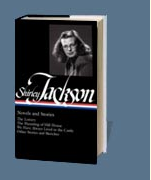
Those who subscribe know that often the Library of America books can land with a clonk. The recent Emerson and Thoreau and Twain volumes were of course good if not thrilling to receive; the Philip K. Dick one of last year was great and surprising, if a bit oddly curated for my tastes. So when the Shirley Jackson collection arrived last week, it was like a party had gone off in the mailbox! A party of words! LADY WORDS EVEN! Now joining an astoundingly slender list of women in the 204-book series, we have, inevitably, heard that Shirley Jackson’s just not worthy. 1. You can suck eggs and 2. go read We Have Always Lived in the Castle and then 3. you can suck eggs some more, dumb boys.
Tag-Playing Gorillas Are Just Like Us! (They Play Tag!)
We are all it! “Like human tag, one gorilla runs up to another and taps, hits, or outright punches the second. The hitter then usually runs away, attempting to avoid being hit back. Davila Ross and her colleagues also noticed that, like kids, the gorillas would reverse roles, so sometimes the first hitter would be the tagger, and vice versa. All African great apes appear to play tag, and younger apes play it much more often than their elders. Tree-dwelling orangutans likely also play a similar game, but not on the ground, according to Davila Ross.”
Vaginas Say The Darndest Things
“I think mine would be a ‘creepy baby voice,’ because a friend once told me I do a voice like that sometimes and I’ve been trying to consciously get rid of it, so it’s only natural that it would go to my vagina. Only it would be a creepy dead ghost baby voice, because of my abortion.”
-What does your vagina sound like?
Very Recent History: The Scandal Sheet Proto-Blog Empire of Stephen G. Clow
by Jane Hu
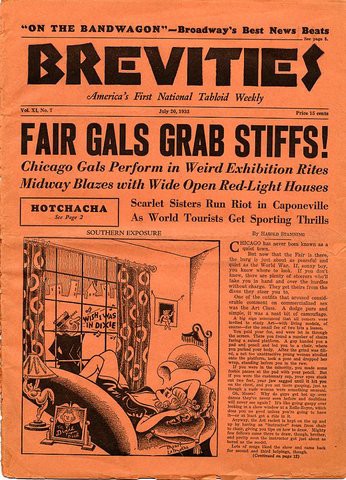
On May 6, 1924, the New York Times announced: “’BREVITIES’ OWNERS INDICTED FOR FRAUD.” Broadway Brevities and Society Gossip, published between 1916–1924, belonged to Stephen G. Clow, a native Canadian who traveled down south to become proprietor of one of the shadiest gossip magazines of New York City. The trial of Clow and his partners lasted until January 30, 1925 and was deemed as the “greatest show on earth” by the New York Sunday News. The result: Clow was fined $6000 and sentenced to six years in federal prison in Atlanta.
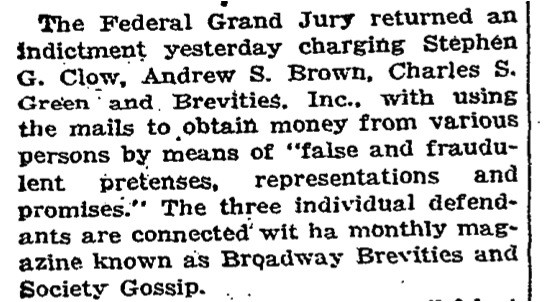
William Straw, who is currently completing his book on Clow and Broadway Brevities, defines Clow’s professional trajectory as “one of virtually uninterrupted decline, as he moved from a position on the edge of New York’s literary and social worlds down into the more tawdry realms of the gossip tabloid and horse racing tip sheet.” Undeniably, there is something classically romantic about the thought of a young and naive Clow who arrived to explore New York, only to fall in with the wrong crowd.
Born in 1873 on Prince Edward Island, Clow’s name first appears in the New York City Directory in its 1903–1904 edition, as the owner of the Broadway Publishing Company. During these early years, Clow’s name periodically came up in the letter pages of the New York Times and its Book Review. One 1908 letter reveals Clow’s fervent defense of his small town “autophobe” sensibilities against the “utterly coarse, brutal, and disgusting characteristics” of automobiles, which he considered a “menace to human as well as brute life.”
If nothing else, these were probably the tamest years of Clow’s love affair with New York City.
In 1916, Broadway Brevities and Social Gossip-the magazine that would inexorably alter and define Clow’s life-was launched. Brevities wrote about “society gossip” and was partial to theater and entertainment news. Its main targets were those who prospered from the postwar economic boom such as newly rich entrepreneurs, producers of fad products (like facial regeneration creams), and Midwesterners who had recently relocated to Manhattan. Indeed, Brevities was aptly named, as it covered stories of short-lived fashions, fame, and wealth.
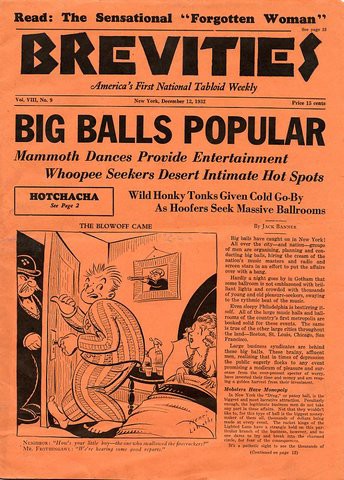
The format of Brevities is surprisingly reminiscent of today’s blog culture: it included paragraph-length rumors about prominent New Yorkers, short lists of questions or hints at scandal and longer pieces “devoted,” as Straw describes, “to the detailed destruction of reputation.” Straw goes on to remark that “much of Broadway Brevities’ distinctiveness lies in the way it interwove the narrative forms of urban expose with the gossip magazine’s charting of social rituals and places of sociability.”
During this period, Brevities was not the only source of gossip in the United States. Many small society publications served similar functions and, as even more insular versions of Brevities, pertained only to the subcommunities who read them. Most came under the same fate as Clow’s magazine: magazines like the Tattler and American Sketch and Town Topics were terminated by the New York Attorney General in 1932.
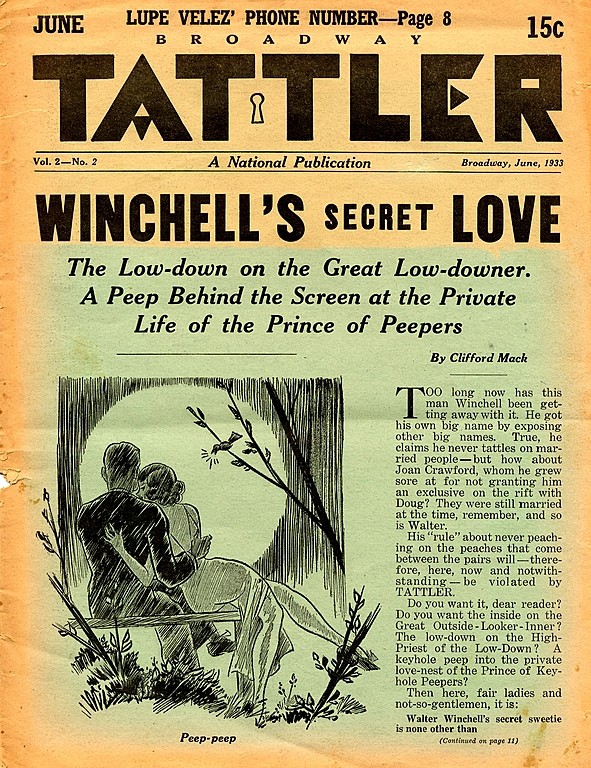
One of Brevities’ more unseasonable publications was its series of articles titled, “A Night in Fairyland,” which attempted to expose the gay and lesbian nightlife of Manhattan. These pieces are a grotesque performance of homophobic sensationalism that applied “on-the-ground” anthropological investigations of the homosexual habitat. In one article, a sexologist “investigate[s] the conditions among followers of the divine Sappho in the metropolis of the New World.” Unfortunately, he was…
unable to meet Lesbians at close range . . . Because of these circumstances, no competent study of New York’s slightly masculine women has yet been published. However, we are informed, one is now being prepared by an eminent authority in the field. He assures us that there really is a place. In fact many places.
After his release from prison, Clow returned again to writing scandal and gossip. In 1930, he initiated New Broadway Brevities which, later, he renamed Brevities: America’s First National Tabloid Weekly (a title which in itself was a glaring lie since Brevities never circulated outside of New York). Unlike Clow’s previous presses, these publications severely lacked both a coherent editorial voice and a clearly identifiable readership. Although defamation of specific individuals still occurred, the new Brevities concentrated on more general depravities and played around with the vulgar rhetoric of not-so-subtle double entendres. Rather than point fingers, Brevities set out to shock anyone and everyone. Clow’s paper lavished in wild stereotypes and parodies-two tropes that, for him, were never mutually exclusive.
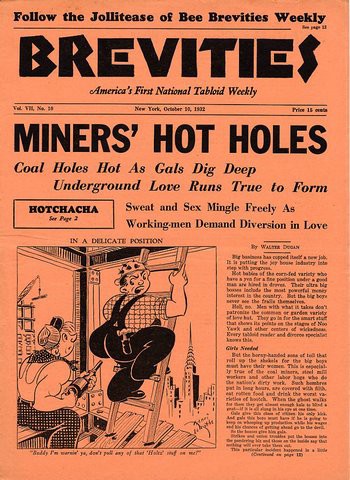
More and more, Clow steered away from current events (which lost their relevancy too quickly) and employed gags, offensive poems, cartoons, press “bloopers” and tall tales. Straw notes that such genres were especially popular during this period because they “were ‘detachable’ and could circulate within less legitimate corners of the magazine industry.”
Also in 1930, while striving to stimulate Canada’s publishing industry, the government enforced hefty tariffs on US periodicals. The detachability of Clow’s earlier pieces came in handy, as he recycled old stories into his new Canadian presses. The eighth issue of Toronto’s Broadway Brevities, published on 1937, included recollections about Greenwich Village in the early 1920s! It also provided profiles of New York gossip columnists. Once involved in a turbid relationship with New York, it seemed Clow was having a rough time in letting go. Pages titled “Gossip of Canada” and “More Dominion News” failed to even mention Canada and seemed to have been taken out of other magazines.
Needless to say, Clow was soon back on trial-this time in Toronto during the January of 1938. Although he was not sentenced to prison, Clow left Canada directly after his court hearing and returned to New York. That March, Manhattan columnist Louis Sobol received a letter from Clow, begging for money.
Alone and destitute, Clow died of cancer in Bellevue Hospital three years later and his body went unclaimed until officials transferred it to the morgue.
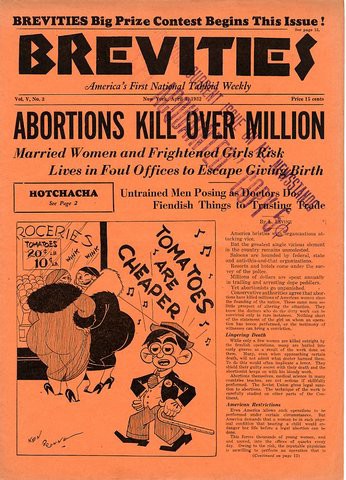
In his early letters to the Times during his first decade in New York City, he melodramatically lamented over the demise of “real” poetry. In these pieces, Clow turns his nose up at those who care only for the “latest novel” and expresses sorrow for anyone who could no longer appreciate Shakespeare or Milton. If he was searching for poetic justice, perhaps he found it.
Jane Hu is the Awl’s summer Very Recent History reporter.
‘Brevities’ and ‘Tattler’ covers courtesy of William Straw.
